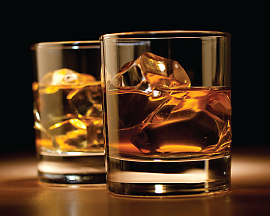Anticonvulsant Drug Shows Efficacy In Treating Alcoholism
Abstract
Gabapentin aids in treating some patients with alcohol dependence, but the jury is out on whether primary care physicians, who often treat that disorder, will prescribe it.
The anticonvulsant medication gabapentin appears to be effective for treating some patients with alcohol dependence and relapse-related symptoms such as craving, insomnia, and dysphoria. It also comes with a favorable safety profile.
These were findings from a study reported by Barbara Mason, Ph.D., a professor at the Scripps Research Institute in La Jolla, Calif., and colleagues in the November 4, 2013, JAMA Internal Medicine.
Gabapentin, approved by the Food and Drug Administration (FDA) for the treatment of epileptic seizures and neuropathic pain, is believed to act by blocking a subunit in the calcium channel in presynaptic nerve sites and, as a result, to modulate the activity of the neurotransmitter GABA. Also, animal research has shown that gabapentin normalizes GABA activity in the amygdala region of the brain, an area that is associated with alcohol dependence. Thus Mason and colleagues decided to conduct a randomized, double-blind, placebo-controlled trial to see whether gabapentin might be an effective treatment for alcohol dependence.
The 12-week trial included 150 men and women older than age 18 with current alcohol dependence. Subjects getting gabapentin received dosages of either 900 mg or 1,800 mg a day. At both the start and end of the study, subjects receiving gabapentin or placebo were evaluated for alcohol consumption, alcohol craving, sleep and mood factors, and possible medication side effects.
Compared with placebo, gabapentin was found to reduce heavy drinking and improve alcohol abstinence significantly. There was also a linear dose effect. Whereas the abstinence rate during the 12-week study period was only 4 percent in the placebo group, it was 11 percent in the 900 mg-a-day gabapentin group and 17 percent in the 1,800 mg-a-day gabapentin group. And though only 23 percent of the placebo group refrained from heavy drinking during the 12-week study period, 30 percent of the 900 mg gabapentin group and 45 percent of the 1,800 mg gabapentin group did.
Moreover, gabapentin was found to be significantly more effective than placebo in reducing alcohol craving, sleep loss, and negative mood. Finally, there were no serious drug-related adverse events seen in subjects receiving gabapentin.

“This is an impressive and revealing study,” Marc Galanter, M.D., a professor of psychiatry and director of the Division of Alcoholism and Drug Abuse at New York University, said in an interview with Psychiatric News. In an editorial accompanying the paper, Edward Nunes Jr., M.D., a professor of clinical psychiatry at Columbia University, added, “The demonstration of the efficacy of gabapentin for relapse prevention among alcohol-dependent patients by Mason et al. is an important development. This well-designed and well-powered trial replicates the positive findings of several previous smaller trials.”
There is a problem, however, Nunes pointed out: “We now have three FDA-approved medications for the prevention of relapse in alcohol dependence—disulfiram, naltrexone hydrocholoride, and acamprosate calcium—as well as topiramate, and now gabapentin—that have a substantial evidence base. Yet medications for alcohol dependence are sorely underutilized.”
Galanter agreed. And one reason why, he suggested, is that “for addiction, a chronic disease, clinicians are most likely to use medications with a demonstrated long-term impact, like buprenorphine for opioid dependence. The impact of gabapentin on alcoholism (like that of naltrexone) is a meaningful but still limited step toward this goal.”
On a more positive note, “Gabapentin has been used ubiquitously by primary care physicians for many other indications, resulting in familiarity with its pharmacology, pharmacokinetics, and adverse effects,” the researchers said in their paper. “Thus, unlike other approved treatments for alcohol dependence that are prescribed by a small number of specialists, gabapentin may be more readily utilized by primary care physicians.”
The study was funded by the National Institute on Alcohol Abuse and Alcoholism. ■
An abstract of “Gabapentin Treatment for Alcohol Dependence” is posted at http://archinte.jamanetwork.com/article.aspx?articleid=1764009.



